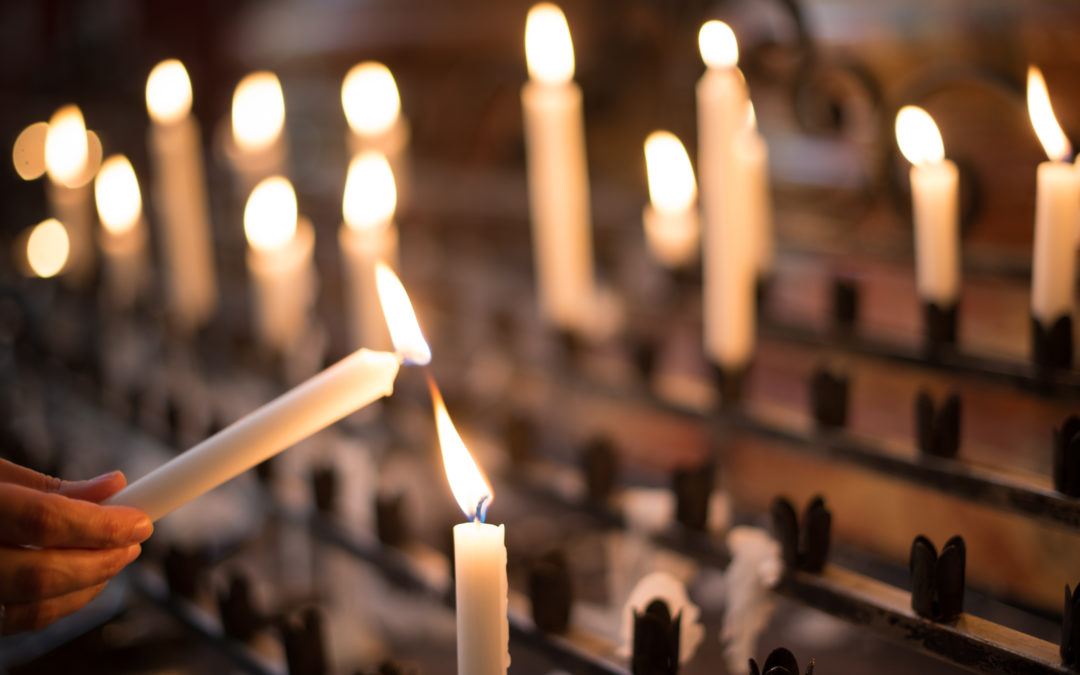Many of us are besieged right now with calls to embrace the joy of the season—to plan parties, buy gifts, don our most festive faces. The promise of time with family and friends sparks joy, indeed, as does the anticipation of Christmas, even as holiday expectations impose their own worldly pressures.
The Church is in the season of Advent, however, still preparing for Christmastide. And Advent holds space for a different set of emotions—for quiet reflection, repentance, and lament; for a long, hard look at the darkness before the light and love of Christ bursts forth. Anglican priest Tish Harrison Warren explains the spiritual purpose of this countercultural season: “It reminds us that joy is trivialized if we do not first intentionally acknowledge the pain and wreckage of the world.”
What a relief that intimacy with the God who loves us includes a holy invitation to lift up our grief, our pain, and our protest, not only our praise and celebration. As someone who spends many a day contemplating injustice, lament to me is vital. And Human Rights Day in our present age is a call to lament, indeed.
A Litany of Wrongs
The US Human Rights Network (USHRN) recently summarized a bevy of civil society reports about violations of human rights in the U.S., which were filed with the United Nations Human Rights Council. The reports cover an array of concerns, like barriers to voting rights that target people of color, excessive use of solitary confinement in our prisons, and the squelching of free speech through retaliation against journalists who expose government wrongdoing—to name just a few.
The Council will consider these accounts as it assesses this country’s full record on human rights next spring—in a process called the “Universal Periodic Review,” which all UN members face every five years.
Numerous reports depict worsening human rights conditions for migrants. Threats to the right to seek asylum, arbitrary and long-term detention in harsh, prison-like conditions, sexual assault, and family separation are among the harms named.
Action to deport vulnerable migrants in need of life-saving medical care by eradicating a humanitarian program that allowed them to stay underscores how ruthless anti-immigrant policies have become.
Inhumane housing policies likewise shock the conscience. Homeless encampments have increased dramatically—rising more than 1300% since 2007. Criminalization of homelessness—punishing un-housed neighbors for things like eating or sleeping in public when they have no other place to go—is also on the rise. Housing poverty hits hardest against migrants, women, and racial and sexual minorities, reflecting how interrelated all of our basic rights are, including freedom from discrimination.
Accountability Is Coming
The present government administration has tried mightily to skirt accountability on human rights and flout the global authorities that protect them, but it cannot forever evade the principles of justice to which all nations are bound.
Come spring, the same United Nations Human Rights Council from which Secretary of State Mike Pompeo led an unprecedented U.S. withdrawal last year will weigh and consider this country’s record on human rights through the Universal Periodic Review (or “UPR”) process. The purpose is to advance human rights by evaluating a country’s progress and failings, and issuing recommendations on how it can improve.
The Council will consider the civil society reports alongside a self-evaluation the U.S. Government is due to provide by February. The former typically challenge and contradict the country’s official submission by giving voice to those whose rights have been endangered, and to their advocates. No doubt this will be the case in 2020—if, in fact, the Trump administration complies with its duty to report.
The Council will consider all the information it receives in light of legal authorities to which the U.S. is subject—the Universal Declaration of Human Rights, the UN Charter, and American treaty obligations on ending torture, eliminating racial discrimination, and protecting civil and political rights. It will also look back at the results of the last UPR, which the United States underwent in 2015, and consider how the U.S. has responded to guidance received then.
The resulting recommendations become a tool and resource for ongoing advocacy here in the U.S. As always, it remains our duty as engaged citizens and communities of faith to press our leaders to safeguard human rights. We’ll have more to share in the months ahead about how you can be involved.
An Advent Invitation
It’s our mission at Justice Revival to empower you to be a faithful, effective advocates for the human rights of neighbors in need. And this December, during the contemplative quiet of Advent, on the occasion Human Rights Day, we invite you to make space for prayerful reflection on “what is cracked and fractured in our world and in our lives,” as Rev. Warren put it.
Consider spending just half an hour with the litany of wrongs that advocates around the country have compiled, just enough time to skim the headlines of suffering in this country. You are invited to share your thoughts below.
What injustice pricks your heart this Advent? What is new and surprising, a confirmation of your concerns, or a challenge to what you thought true? This space is for you.
Searching the darkness takes courage and faith; and as a result, may the transformative, loving power of Christ’s coming carry even deeper meaning for you this Christmas, and in the year to come.
